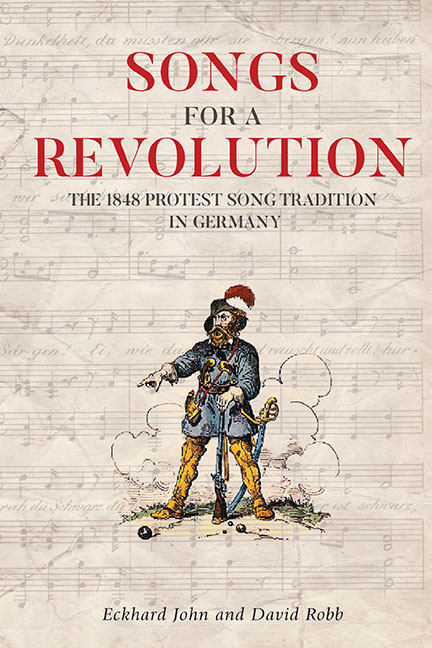Book contents
- Frontmatter
- Contents
- Preface
- Introduction: The Emergence of Political Song 1830–48
- Part I Before 1848: The Vormärz
- Part II 1848–49
- Part III 1848 in Memory
- Conclusion: The Making of Tradition; The Protest Songs of 1848 in the German Folk Revival 303
- Bibliography
- Discography
- Index of Names and Terms
- Index of Song Titles
13 - “Ausgelitten, ausgerungen”
Published online by Cambridge University Press: 23 October 2020
- Frontmatter
- Contents
- Preface
- Introduction: The Emergence of Political Song 1830–48
- Part I Before 1848: The Vormärz
- Part II 1848–49
- Part III 1848 in Memory
- Conclusion: The Making of Tradition; The Protest Songs of 1848 in the German Folk Revival 303
- Bibliography
- Discography
- Index of Names and Terms
- Index of Song Titles
Summary
THE POLITICAL SONG “Ausgelitten, ausgerungen” (Suffered, Worn- Out) was written by August Heinrich Hoffmann von Fallersleben in December 1848. A reaction to the constitution imposed by King Friedrich Wilhelm IV of Prussia shortly before, it satirizes the readiness of the bourgeoisie to sacrifice the achievements of the revolution in favor of a conservative social order. Hoffmann set it to the melody of “Guter Mond, du gehst so stille” (Dear Moon, You Go so Quietly). In the 1960s, the song was revived by singers such as Peter Rohland. Since then, it has been occasionally performed as part of the memory culture surrounding the revolution of 1848–49.
August Heinrich Hoffmann von Fallersleben (1798–1874), a philologist as well as a poet, is primarily known as the author of the national anthem “Lied der Deutschen” (Song of the Germans, 1841). Hoffmann wrote “Ausgelitten, ausregungen” as a direct reaction to the events of early December 1848, when the king of Prussia dissolved the Prussian National Assembly and simultaneously decreed a new constitution. In what amounted to a coup d’etat, the counterrevolutionary forces in Prussia emerged largely as victorious, while the new constitution sought to placate the liberal bourgeoisie's more moderate expectations of reform.
This conservative swing in Prussia directly affected Hoffman von Fallersleben's living circumstances. Six years earlier, in 1842, the liberal patriotic poet had been stripped of his professorship in Breslau and his pension for publishing the volume Unpolitische Lieder (Unpolitical Songs). In this he had criticized the absolute power of the princes and spoken up for a democratic and free bourgeois society. A year later, Hoffmann’s Prussian citizenship was revoked, with the result that he lost his rights of residency. He consequently was often forced to change his place of abode, constantly under police observation as a “singender Agitator” (singing agitator), until the Prussian General Amnesty of March 20, 1848 allowedthe former professor to entertain hopes of a rehabilitation. By the autumn of 1848 he was living in Berlin on a Prussian state “Wartegeld” allowance.The day after Frederick William imposed the new constitution on December 5, 1848, Hoffmann wrote his riposte “Ausgelitten, ausgerungen” and published it that same week in the broadside Zwölf Zeitlieder. On December 12, 1848, with Berlin under a state of siege, Hoffmann was served notice to leave the city immediately “bei Vermeidung der Verhaftung” (in order to avoid arrest).
- Type
- Chapter
- Information
- Songs for a RevolutionThe 1848 Protest Song Tradition in Germany, pp. 187 - 196Publisher: Boydell & BrewerPrint publication year: 2020



